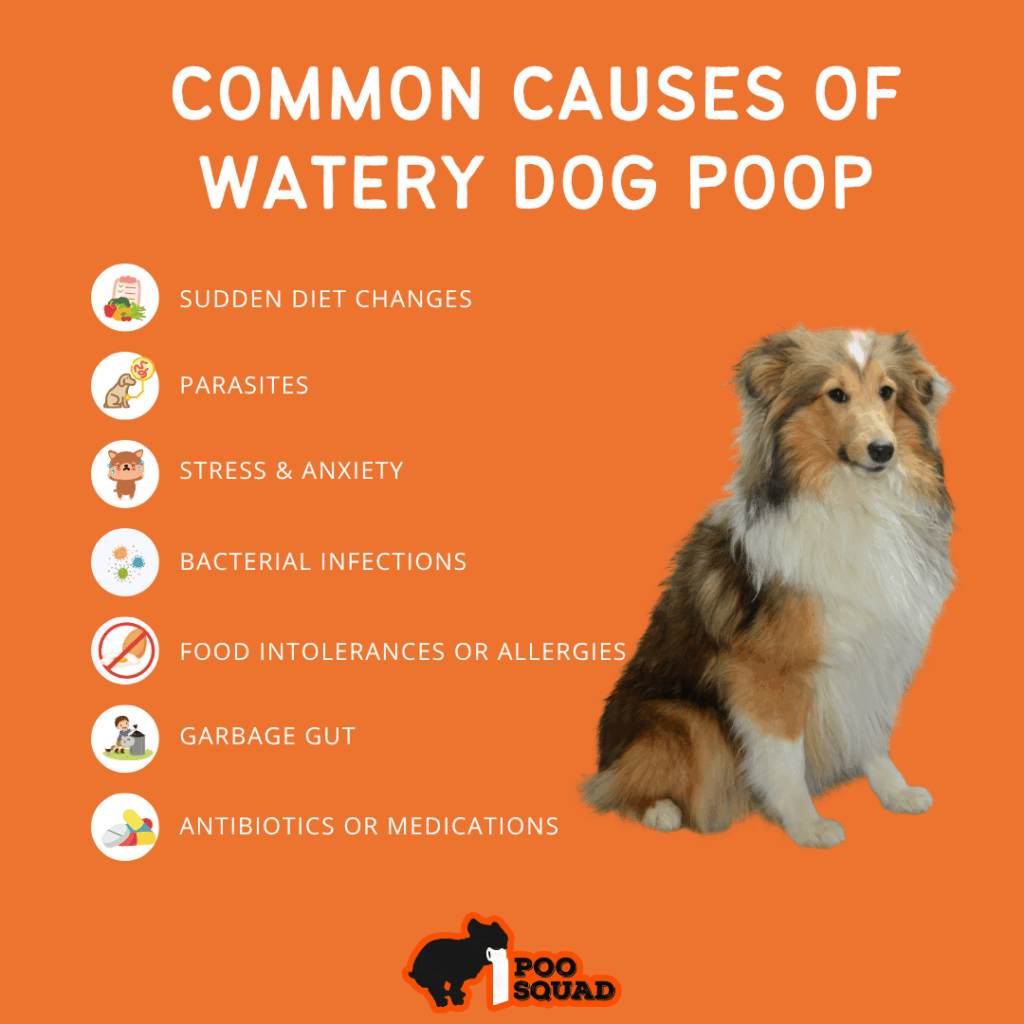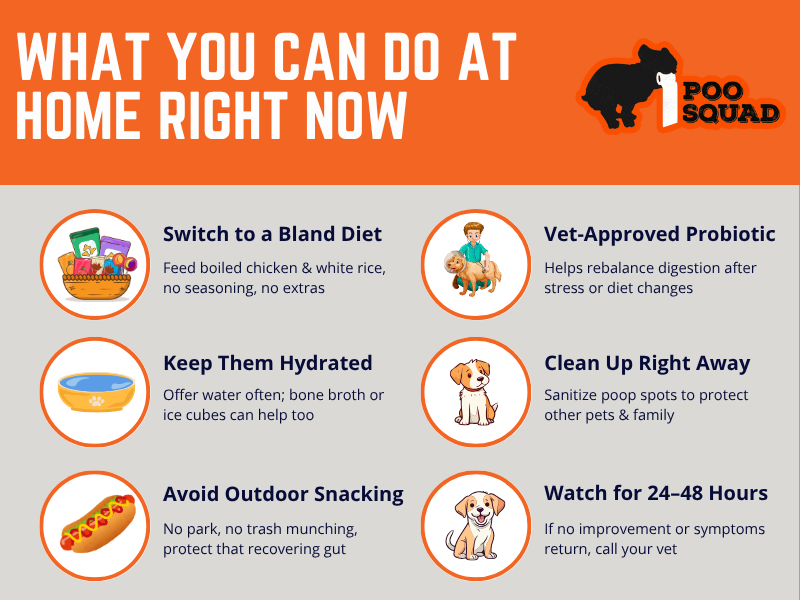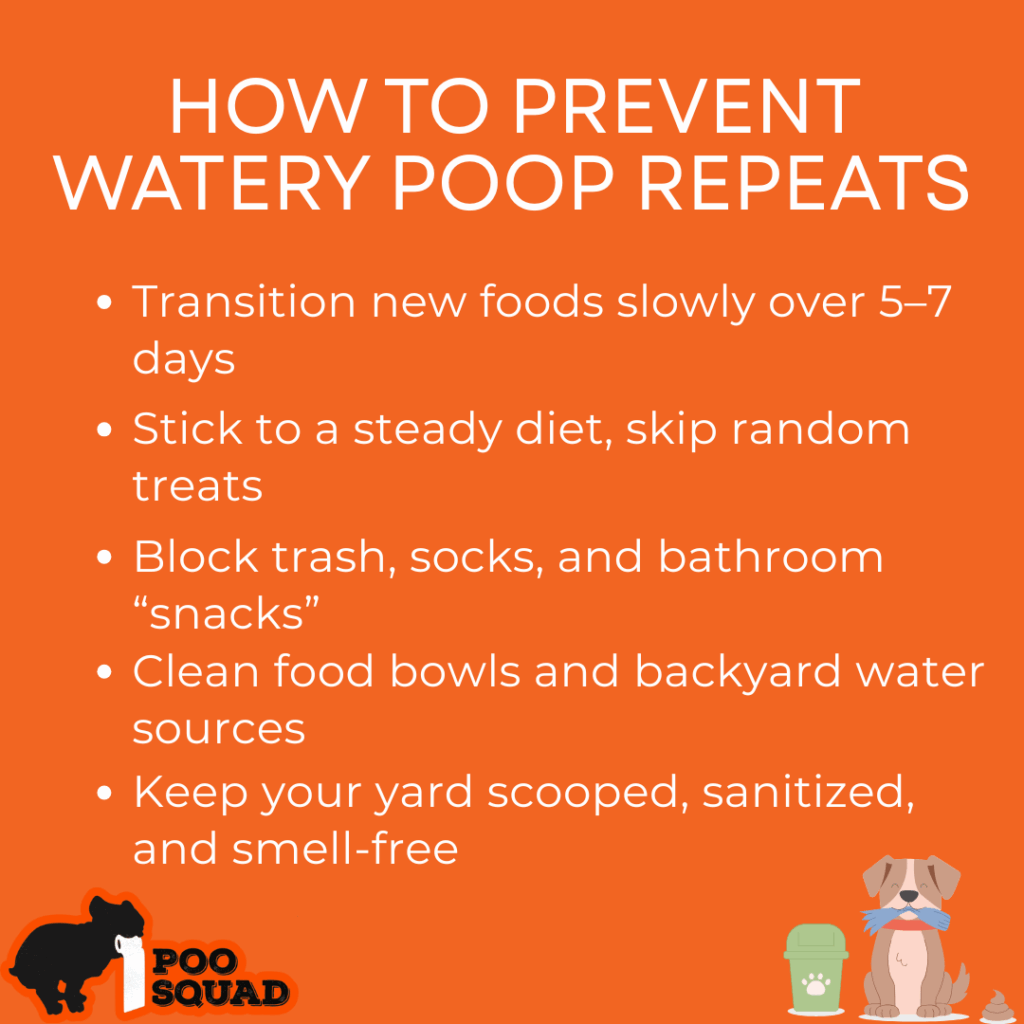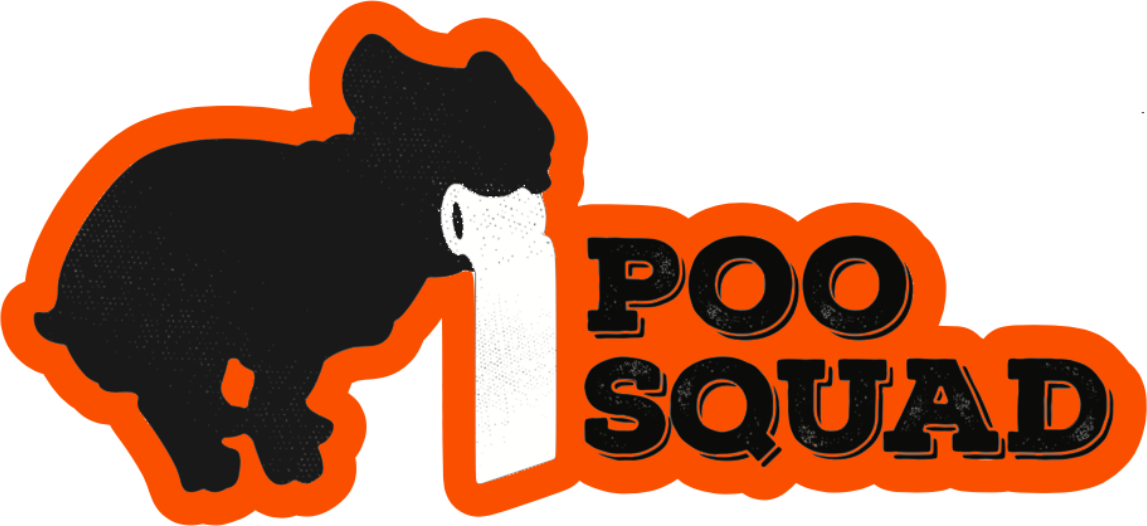Watery dog poop is often caused by sudden diet changes, parasites, stress, or bacterial infections. If it persists beyond 48 hours, includes blood, or is paired with vomiting or lethargy, consult your vet immediately. Early action can prevent more serious health issues.

Watery dog poop signals that something’s off, whether in your dog’s gut, diet, or daily routine. It could be a simple reaction to new food, or a warning sign of parasites, infection, or internal irritation. And unless you’re checking every day, you might not notice it until it becomes a bigger problem.
- Sudden diet changes and stress are common culprits.
- Parasites or bacterial infections may also be to blame.
- Watery stool that lasts beyond 48 hours or includes blood requires vet attention.
Most owners assume poop issues are one-offs. But when stool turns liquid, spreads through grass, or requires a hose to clean up, that’s not normal; it’s your dog’s system asking for help. These episodes often go untracked, especially if multiple people in the home assume someone else is handling yard duty.
When we see puddle-level poop, odd colors, or mucusy textures during routine service, we document it, so you can take action before it turns into a vet visit. We’ve helped families catch everything from Giardia to dietary intolerances this way.
The most common triggers we see in real yards, and when loose stool means it’s time to call the vet. Whether this is a one-time accident or a recurring mess, you’re about to get real answers and solutions that work.
What Counts as “Watery” Dog Poop Anyway?
Watery poop is not the same as a soft or loose stool. We’re talking about the puddle-level mess, mucusy, liquid, or paint-like texture that spreads through grass or runs off the concrete.
- If you’ve ever had to hose it down or it slipped through your scooper, that’s watery.
- Common appearances include a melted pudding look, colored streaks, or watery ends after a solid start.
This kind of stool usually signals irritation, infection, or something deeper. We’ve seen it all: what looks like melted pudding, colored streaks from mystery toys, or watery ends after a solid start. Those aren’t “quirky” one-offs. They’re often signs of gut issues your dog can’t tell you about.
When our scoopers see runny stools like this, we don’t only clean and go. We snap a photo, log it on your service notes, and update your dog’s Poop Report Card. It’s one of the biggest benefits of using a professional pooper scooper service, you get health insights you wouldn’t otherwise have time (or desire) to notice.
- A stool that starts firm and ends watery is often linked to:
- Poor digestion
- Stress
- Food allergies that appear mid-process
The 12 Most Common Causes of Watery Dog Poop
There’s a wide range of reasons your dog’s poop may look more like soup than solid. From food changes to parasites, each case comes with its warning signs and its own fixes. Understanding what’s behind the mess is the first step to solving it.
1. Sudden Diet Changes
Switching foods too fast can wreak havoc on a dog’s gut. Even high-quality kibble or new treats can trigger digestive upset if not phased in slowly over 5–7 days. If you made a change recently, this could be your culprit.
2. Parasites (Giardia, Worms)
Watery or mucousy poop is a red flag for parasites. Giardia, in particular, is sneaky; it often takes multiple fecal tests to detect. Regular deworming helps, but clean-up also matters. That’s why we sanitize our tools between yards to prevent cross-contamination.
3. Stress & Anxiety
New baby?
Fireworks?
Travel?
Dogs can get stressed too, and their guts show it. We often see watery poop patterns spike after major life changes, especially in multi-dog households or high-energy breeds adjusting to something new.
4. Bacterial Infections
Bugs like Salmonella and Clostridium can trigger explosive diarrhea. These often come from contaminated food, puddle water, or trash diving. If your dog has other symptoms like vomiting or lethargy, this is one to take seriously.
5. Food Intolerances or Allergies
Grains, beef, chicken, and your dog might not tolerate something they eat every day. A watery stool is often the first sign. An elimination diet with your vet can help zero in on the ingredient-causing issues.
6. Garbage Gut (a.k.a. Trash Can Buffet)
When dogs get into things they shouldn’t, like expired food, table scraps, or compost, the result is often immediate and… unmissable. It’s one of the top reasons for overnight diarrhea calls.
7. Antibiotics or Medications
Has your dog recently finished a course of meds? Many antibiotics wipe out good gut bacteria along with the bad, causing temporary soft or runny stool. A vet-recommended probiotic can help rebalance things.
8. Contaminated Water Sources
Drinking from streams, puddles, or communal bowls at the dog park can expose pups to parasites or bacteria. If your dog gets loose poop after outings, water might be the common thread.
9. Overeating Rich Treats
Even a few extra training snacks can overload your dog’s digestive system. High-fat treats are especially risky and can lead to pancreatitis if not managed.
10. Pancreas or Liver Problems
Chronic or greasy diarrhea can point to underlying conditions like pancreatitis or liver disease. These usually come with other symptoms, but not always. Keep an eye on poop texture and color changes over time.
11. Environmental Triggers
We’ve seen more than one case of mystery diarrhea linked to yard chemicals. Lawn treatments, fertilizers, or even neighborhood spray zones can irritate your dog’s system, especially if they’re sensitive.
12. Foreign Object Ingestion (aka Poocasso Moments)
From socks to crayons to bits of rubber toys, some dogs have a taste for the bizarre. Watery stool with colorful chunks? That’s what we call a Poocasso, it’s messy art and a digestive nightmare rolled into one. Keep a close eye and consider our pet profile program in case your curious pup ever goes missing mid-episode.
Is Watery Poop a Medical Emergency?
Not all diarrhea needs a vet visit, but some situations demand immediate action. The key is knowing when to wait and when to worry. If your dog is otherwise acting normal, you might be safe to monitor. But combine watery poop with other symptoms? That’s when you pick up the phone.
So, when should you act fast?
- If there’s blood in the stool
- If your dog is vomiting, lethargic, or refusing food
- If the diarrhea lasts more than 48 hours
- If it starts after a known exposure (like trash, chemicals, or spoiled food)
One gram of dog poop can contain over 23 million coliform bacteria. That’s not something to ignore. And if your dog is having frequent, runny accidents, especially paired with behavioral changes or bad breath, it could be the gut’s way of waving a big red flag.
We’ve had clients thank us for more than clean yards. After receiving their Poop Report Card and noticing consistent puddle-like stool, some booked emergency appointments that uncovered serious infections. Those dogs got treatment early, and that made all the difference.
You don’t have to panic at the first loose stool. But if it’s paired with other warning signs, don’t wait. And if you’d rather not guess, let us keep an eye on your puppy’s poop for you. Our residential dog poop service is about more than scooping, it’s preventive care in disguise.
What You Can Do at Home Right Now
When your dog has watery poop, it’s tempting to panic. But in many cases, a few simple steps can help you manage the situation without an emergency vet bill. The goal is to settle your dog’s gut and watch for improvement over the next 24–48 hours.

Here’s what we recommend starting with:
1. Switch to a Bland Diet
Boiled chicken and white rice work wonders. Skip the seasonings, oils, or treats, stick to two ingredients and small portions.
2. Prioritize Hydration
Loose stool can quickly lead to dehydration. Offer small amounts of water often. You can even use low-sodium bone broth or add ice cubes to encourage drinking.
3. Avoid Outdoor Snacking
Until your dog’s back to normal, skip the dog park and keep a close eye in the yard. We’ve seen far too many cases of “trash can gut” turn into all-weekend cleanups.
4. Use a Vet-Approved Probiotic
Probiotics can help restore gut balance after stress, food changes, or antibiotics. Ask your vet what brands they trust.
5. Clean Yard & Surfaces Promptly
Sanitize the area to reduce bacterial exposure, especially if you’ve got multiple dogs or kids in the yard. Our yard deodorizing and sanitation service can help here if things get out of hand.
6. Monitor for 24–48 Hours
If things improve quickly and your dog seems otherwise happy, you may be in the clear. But if the runs persist, or return after a few days, it’s time to dig deeper.
One common situation we see? The poop starts solid, then turns watery halfway through. This can point to incomplete digestion or fast food transit through the gut. It’s not always urgent, but it’s not something to ignore if it keeps happening.
What Most Dog Owners Don’t Realize About Watery Poop
The mess in your yard might be telling a bigger story than you think. For most people, cleaning up after the dog is a dreaded chore, done fast, often skipped, and rarely inspected. But if no one’s watching what comes out, how do you know what’s going on inside?
That’s one reason so many of our clients had no clue their dog had chronic diarrhea until we showed them. It’s not about laziness; it’s time, distractions, and busy schedules. We’ve seen customers go months without realizing their dog’s poop was more puddle than pile.
And let’s talk about the myths we hear daily:
- “The lawnmower chops it up and fertilizes the yard.”
Wrong. Dog poop is not a fertilizer, it’s toxic. And when it watery? That bacteria spreads fast and deep, especially after rain. - “It looks fine most days.”
Sure, maybe the first half of the poop is solid. But if the tail end is runny, there’s still an issue. That’s often a sign of intestinal inflammation or food intolerance. - “I thought the kids were picking it up.”
Yeah, we’ve heard that one too. If everyone thinks someone else is doing it, no one is. And watery stool left alone doesn’t only smell, it soaks, seeps, and spreads.
One of our team members recently flagged an ongoing case of pudding-like poop for a senior customer who hadn’t noticed. The vet later diagnosed a pancreatic issue, caught early, thanks to a regular service check.
If you don’t want to guess whether your dog’s poop is “normal,” our professional poop scooping team is trained to spot the difference and let you know discreetly, before things get serious.
How We Help Spot and Prevent Problems
We’re not your average scoop-and-go service. When your dog’s health is hiding in the grass, every detail counts. That’s why our service goes beyond clean yards, we give you eyes on what your dog’s leaving behind, especially when it’s watery.
Dog Poop Report Cards
If we see something unusual, you’ll know. From runny textures to odd colors or visible parasites, we track changes and send notes. It’s proactive, judgment-free, and often the first sign of a larger issue.
Sanitized Tools, Every Time
We clean and disinfect our gear and shoes in every yard. No cross-contamination. This matters a lot when one dog has loose stool; we’re not dragging that bacteria into someone else’s space.
Bright Orange, Fully Verified Staff
We wear safety orange for visibility and security. Our team is background-checked, badged, and QR code verified. If you ever wonder who’s in your yard, you don’t have to guess.
Triple Gate Check + Photo Proof
After every visit, we send a photo of your locked gate. That means when your dog bolts out for a post-scoop zoomie, you’ll know it’s safe, even if they’ve had a diarrhea episode the day before.
Pet ID Program for Runaway Pups
If your dog ever escapes, their custom QR-coded tag links to a live profile where anyone can contact you instantly. We’ve helped reunite pets this way, including a few who slipped out mid-bathroom emergency.
We even offer yard sanitation and deodorizer add-ons for households dealing with recurring diarrhea, sick pups, or simply tired of the lingering smell.
With us, you’re not only getting poop picked up, you’re getting an early warning system, peace of mind, and one less thing to worry about when life’s already full.
How to Prevent It from Happening Again

Dealing with watery poop once is stressful enough. Dealing with it every week? That’s exhausting. Prevention is not complicated, but it does require consistency. Here’s how to reduce the odds of your dog getting the runs again.
Transition Foods Slowly
Whether you’re switching kibble, trying raw, or introducing a new treat, always go gradually. Mix old and new over 5–7 days. A full swap overnight is one of the most common triggers for watery stool we see.
Stick to a Consistent Diet
Avoid switching between proteins or treatment types constantly. Once your dog’s gut gets into a rhythm, keep it steady. Random table scraps or new jerky from the pet store can throw things off fast.
Control Access to Trash & Toys
Some of our most colorful Poop Report Cards came from dogs who got into crayons, socks, or bathroom trash. Use baby gates, lidded bins, and supervised play to reduce the risk.
Sanitize Bowls & Outdoor Water Sources
Communal water bowls or stagnant backyard puddles can host bacteria and parasites. Make it a habit to clean water bowls and empty standing water, especially after storms.
Feed at Set Times
Free feeding leads to inconsistent digestion. Stick to two set meals per day, same times, same portions. It helps regulate stool and makes it easier to spot changes.
Keep Your Yard Clean and Deodorized
Leftover poop spreads bacteria, draws flies, and can even contaminate paws. A consistently scooped yard is one of the best ways to prevent gut issues. Our yard sanitation service is perfect for households with sensitive pups or lingering smells.
Want to go further? Here’s a quick checklist:
- Don’t change treats too often
- Wash food bowls every 1–2 days
- Freeze toys that can’t be sanitized
- Use probiotics after antibiotics
- Keep your dog’s pet profile updated (in case they run off mid-incident)
The goal is not perfection. It’s awareness. When you stay on top of the little things, you’ll catch problems before they become messes.
When Watery Poop Is About More Than Only Poop
For most people, it’s not only diarrhea. It’s the stress that comes with it. Cleaning up the yard before the company arrives. Arguing over whose turn it is. Worrying whether it’s something serious.
- “You saved our marriage.”
- “It’s not about the dog anymore. It’s about time, frustration, and who cares enough to do something.”
We’ve had senior citizens tear up when they saw a clean yard after weeks of not being able to manage it themselves.
- For them, having a dog is about companionship and joy, not navigating a minefield of puddles in the grass.
And let’s not forget the embarrassment. You invite friends over for a BBQ, and the first whiff they get is that telltale sour smell coming from the backyard. You shouldn’t have to stress about something so easy to solve with regular, professional help.
Our goal is not to guilt anyone. Life is full. People get busy. But when dog poop, especially the watery kind, becomes the thing that tips your day from manageable to miserable, it’s time to call in backup.
We clean up the literal mess, yes. But more importantly, we remove the mental load that comes with it. And if you’ve been dealing with it quietly, know that you’re not alone, and you don’t have to be.
What to Do Next
If your dog’s poop is watery, don’t ignore it. Loose stool is your dog’s way of signaling something’s off, whether it’s their food, stress levels, or something more serious. Watch for red flags like blood, vomiting, or behavior changes, and act fast if symptoms stack up.
In the meantime, a bland diet, hydration, and close monitoring can help stabilize things. But if the mess keeps coming back, there’s likely a deeper issue at play. You don’t have to guess, and you don’t have to do it alone.
We’re here to help you notice the changes that matter most. From dog poop report cards and pet safety tools to complete yard sanitation, our services are built to protect more than lawns, we protect your time, your peace of mind, and your dog’s well-being.
Still wondering what’s normal and what’s not?
Want the full guide on gut health, cleanup tips, and when to escalate?
That’s what the rest of this blog is for.
Questions Pet Owners Are Asking
When your dog’s poop turns to soup, a million questions run through your head. We’ve heard them all, and we’ve helped answer most of them right in the yard. These are the questions other pet owners are quietly wondering too.
Why does my dog’s poop start solid and end watery?
This often points to poor nutrient absorption or fast gut transit. The first part of the stool forms in the colon, but if the rest of the digestive process is irritated or inflamed, things get runny by the end. It’s a common flag for food sensitivity or stress.
My dog seems fine otherwise, should I still be concerned?
Absolutely. Dogs hide discomfort well. If the diarrhea keeps happening, even without other symptoms, it’s still worth checking out. We’ve seen cases where early warnings were spotted through poop long before energy or appetite changed.
Could this be related to stress or a schedule change?
Yes. Dogs are creatures of habit. Moving homes, new pets, visitors, or even a missed walk can create enough tension to mess with their gut. We’ve seen entire neighborhoods report loose stool spikes after fireworks or storms.
Is watery poop contagious to other dogs?
If the cause is parasitic or bacterial, yes. That’s why our scoopers sanitize between every yard, and why we always recommend families with multiple dogs clean up immediately and avoid shared bowls.
Why is it worse at night or during walks?
Some dogs get stimulated by movement or the cool of the evening. But recurring diarrhea during walks could also be a sign of anxiety or environmental irritation, like exposure to fertilizer or communal areas. If your dog has this pattern, it’s worth monitoring closely.
We’ve found that questions like these don’t come up at the vet’s office; they come up at home, during clean-up. That’s why our residential pooper scooper service is not about clean yards only, it’s about support, peace of mind, and being your second set of eyes.
